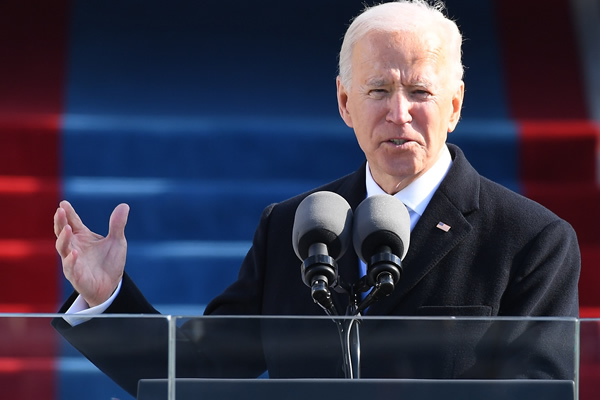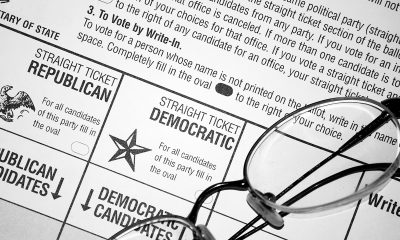News
Biden on Pride Month: ‘Accept nothing less than full equality’
WH proclamation issued after practice ignored during Trump years

President Biden issued the first formal proclamation of his administration recognizing Pride Month on Tuesday, telling LGBTQ people both at home and abroad they should “accept nothing less than full equality.”
Biden’s proclamation kicks off Pride Month by remembering the 1969 riots at Stonewall Inn that started the modern LGBTQ movement, which he said was a “call to action that continues to inspire us to live up to our nation’s promise of equality, liberty, and justice for all.”
“Pride is a time to recall the trials the Lesbian, Gay, Bisexual, Transgender, and Queer (LGBTQ+) community has endured and to rejoice in the triumphs of trailblazing individuals who have bravely fought — and continue to fight — for full equality,” Biden writes. “Pride is both a jubilant communal celebration of visibility and a personal celebration of self-worth and dignity.”
Biden issues a Pride Month proclamation after the practice was abandoned under President Trump, who largely ignored the occasion except for a solitary tweet in 2019. In contrast, former President Obama issued a Pride proclamation each of his eight years in office.
Obama also had a practice of holding an annual reception at the White House with LGBTQ leaders to commemorate Pride Month. The Biden White House, at a time when the nation is reemerging after the coronavirus pandemic, hasn’t said one way or the other whether it will hold a reception.
Biden’s proclamation also ticks off several of the LGBTQ community’s achievements, citing “historic Supreme Court rulings” that brought workplace protections and marriage equality as well as the enactment of the Matthew Shepard & James Byrd Jr. Hate Crimes Prevention Act in 2009, which expanded hate crimes protections under federal law.
Estimating nearly 14 percent of the 1,500 agency appointees in the Biden administration identity as LGBTQ, Biden writes the LGBTQ community is now represented “in nearly every level of public office — in city halls and state capitals, governors’ mansions and the halls of the Congress, and throughout my administration.” Among his LGBTQ appointees are Transportation Secretary Pete Buttigieg and Rachel Levine, assistant secretary of health.
At a time when states have enacted laws against transgender kids’ access to school sports and transition-related health care, Biden writes states have “chosen to actively target transgender youth through discriminatory bills that defy our nation’s values of inclusivity and freedom for all.”
Following the announcement his State Department would make LGBTQ human rights a priority, Biden writes he’s committed to LGBTQ rights both in the United States and overseas, closely tying two global movements to protect and advance democracy.
“LGBTQ+ rights are human rights, which is why my administration has reaffirmed America’s commitment to supporting those on the front lines of the equality and democracy movements around the world, often at great risk,” Biden writes. “We see you, we support you, and we are inspired by your courage to accept nothing less than full equality.”
Biden also name-checks the Equality Act, federal legislation that would expand the prohibition on discrimination against LGBTQ people under federal law, although the legislation is all but dead as it continues to languish in Congress.
“I will not rest until full equality for LGBTQ+ Americans is finally achieved and codified into law,” Biden writes. “That is why I continue to call on the Congress to pass the Equality Act, which will ensure civil rights protections for LGBTQ+ people and families across our country.”
Concluding his proclamation, Biden says Pride Month is a time to recognize “the resilience and determination of the many individuals who are fighting to live freely and authentically.”
“In doing so, they are opening hearts and minds, and laying the foundation for a more just and equitable America,” Biden writes. “This Pride Month, we affirm our obligation to uphold the dignity of all people, and dedicate ourselves to protecting the most vulnerable among us.”
District of Columbia
Gay ANC member announces candidacy for Ward 1 D.C. Council seat
Community leader Brian Footer seeking seat held by Brianne Nadeau

Gay Advisory Neighborhood Commissioner Brian Footer, a community activist who has been involved for many years in local and national government affairs, has announced his candidacy for the Ward 1 D.C. Council seat up for election in 2026.
Footer, a Democrat, will be running in the city’s June 2, 2026, Democratic primary for the Ward 1 Council seat, but it is uncertain whether he will be running against incumbent Ward 1 Council member Brianne Nadeau (D). Nadeau has not yet announced if she plans to run for re-election for a fourth term following her 12 years on the Council.
Nadeau has been a longtime vocal supporter of the LGBTQ community.
If Footer were to win the primary and the November 2026 general election, he would become the Council’s second openly gay member. Ward 5 Council member Zachary Parker (D) is currently the 13-member Council’s only gay member.
Footer is a three-term ANC commissioner who currently serves as Chair of ANC 1E, which represents the city’s Adams Morgan neighborhood.
“Brian has worked at every level of government — federal, state, and local — building a career rooted in public service, aging policy, and inclusive urban planning,” a statement on his campaign website says.
“I’m running for Council because too many people in Ward 1 are doing everything right and still feel ignored by the city they call home,” Footer states on his website.
“I’m running because we can do better,” his statement continues. “That means making housing more affordable, addressing homelessness with real solutions, and keeping our neighborhoods safe with smart, community focused strategies.”
When contacted by the Washington Blade for comment, Nadeau said she was not ready at this time to discuss her plans about running again or about Footer’s candidacy.
“The primary is a ways away, and I’m very focused right now on the budget and the stadium deal and all the work that we’re doing at the Council,” she told the Blade. “So, I really haven’t had time to turn to my plans. So, as a result, I’m also not going to be commenting on anybody else who is determined that they’re running at this time.”
She first won election to the Council in 2014 after she defeated four-term gay Ward 1 Council member Jim Graham in the Democratic primary after Graham became embroiled in an ethics controversy.
In the 2022 Democratic primary Nadeau defeated gay challenger Salah Czapary in a three-candidate race, by a margin of 48.5% of the vote compared to Czapary’s 30.9%.
With the third candidate, Sabel Harris, receiving 20.4%, the outcome showed that the two challengers had a combined total vote count higher than Nadeau.
Further details of Footer’s candidacy can be accessed from his campaign website, brianfooterdc.com.
Spain
Spanish women detail abuses suffered in Franco-era institutions
Barcelona-based photographer Luca Gaetano Pira created ‘Las Descarriadas’ exhibit

A Barcelona-based photographer, audiovisual artist, and activist has created an exhibit that profiles Spanish women who suffered abuse in institutions that Gen. Francisco Franco’s dictatorship established.
Luca Gaetano Pira, who is originally from Italy, spoke with women who the regime, which governed Spain from 1936-1975, sent to Women’s Protection Board institutions.
The regime in 1941 created the board the country’s Justice Ministry oversaw.
Franco named his wife, Carmen Polo, as the board’s honorary president. Then-Prime Minister Felipe González fully dissolved the board in 1985, a decade after Franco’s death.
Gaetano’s exhibit is called “Las Descarriadas” or “The Misguided Women” in English.
“These are women who were detained between 1941 and 1985 for reasons that are unthinkable today: being lesbian, poor, pregnant out of wedlock, rebellious, politically active … or simply considered ‘morally suspect,'” Gaetano noted to the Washington Blade.
Groups affiliated with the Spanish Catholic Church ran these institutions. Gaetano pointed out they were “presented as social assistance centers.”
“In reality, they were spaces of punishment and forced reeducation, where isolation, unpaid work, and psychological violence were the norm,” he said. “Many of the survivors are still alive. Their testimonies are powerful, urgent, and of extraordinary current relevance.”
The regime sent more than 40,000 women to Women’s Protection Board institutions.
“Despite its seemingly benevolent name, it was in fact one of the most powerful instruments of moral and social control over women during and after the dictatorship,” notes the exhibit. “Under the guise of care and re-education, this institution functioned as a repressive apparatus that punished women who deviated from the ideal feminine model imposed by Franco’s regime: submissive, obedient, married, and dedicated to motherhood within the Catholic family structure.”
The Spanish Catholic Church last month issued a public apology, but Gaetano described it as “very soft” and noted “the women did not accept it.” Gaetano also compared the Women’s Protection Board institutions to Ireland’s Magdalene Laundries.
The Associated Press notes tens of thousands of “fallen” women were sent to the laundries that Catholic nuns operated in Ireland from the 18th century until the mid-1990s. Then-Irish Prime Minister Edna Kenny in 2013 issued a formal apology for the abuses that women suffered in the laundries and announced the government would compensate them.
The Spanish government has yet to offer compensation to the women abused in Women’s Protection Board institutions.
“My work focuses on recovering the historical memory of marginalized communities, particularly through the portrayal of survivors of institutional violence and the use of archival materials,” Gaetano told the Blade, noting he has also sought to highlight the repression that LGBTQ people suffered during dictatorships in Portugal and Latin America.
Gaetano’s exhibit can be found here:
District of Columbia
Gay GOP group hosts Ernst, 3 House members — all of whom oppose Equality Act
Log Cabin, congressional guest speakers mum on June 25 event

U.S. Sen. Joni Ernst (R-Iowa) and three women Republican members of the U.S. House appeared as guest speakers at the June 25 meeting of Log Cabin Republicans of D.C., the local chapter of the national LGBTQ Republican group with that same name.
The U.S. House members who joined Ernst as guest speakers at the Log Cabin meeting were Celeste Maloy (R-Utah), Kat Cammack (R-Fla.), and Julia Letlow (R-La.).
Neither D.C. Log Cabin Republicans President Andrew Minik nor spokespersons for Ernst or the three congresswomen immediately responded to a request by the Washington Blade for comment on the GOP lawmakers’ appearance at an LGBTQ GOP group’s meeting.
“Please join us for an inspiring evening as we celebrate and recognize the bold leadership and accomplishments of Republican women in Congress,” a D.C Log Cabin announcement sent to its members states.
“This month’s meeting will highlight the efforts of the Republican Women’s Caucus and explore key issues such as the Protection of Women and Girls In Sports Act and the broader fight to preserve women’s spaces in society,” the message says.
It was referring to legislation pending in Congress calling for banning transgender women from participating in women’s sports events.
According to media reports, Ernst and the three congresswomen have expressed opposition to the Equality Act, the longstanding bill pending in Congress calling for prohibiting discrimination based on sexual orientation and gender identity in the areas of employment, housing, and public accommodations.
The Log Cabin announcement says the meeting was scheduled to take place at the Royal Sands Social Club, which is a restaurant and bar at 26 N St., S.E. in the city’s Navy Yard area.
D.C. Log Cabin member Stuart West, who attended the meeting, confirmed that Ernst and the three congresswomen showed up and spoke at the event.
“It was a good turnout,” he said. “I would definitely say probably 30 or 40 people attended.” West added, “Four women came to talk to a group of mostly gay men. That’s something you don’t see very often.”
-

 Federal Government2 days ago
Federal Government2 days agoTreasury Department has a gay secretary but LGBTQ staff are under siege
-

 Virginia3 days ago
Virginia3 days agoDefying trends, new LGBTQ center opens in rural Winchester, Va.
-

 District of Columbia2 days ago
District of Columbia2 days agoGay GOP group hosts Ernst, 3 House members — all of whom oppose Equality Act
-

 Opinions4 days ago
Opinions4 days agoUSAID’s demise: America’s global betrayal of trust with LGBTQ people









